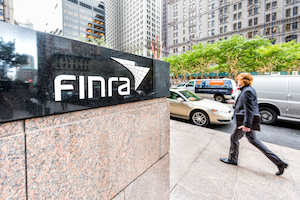 Amid the ongoing upheaval caused by the COVID-19 pandemic, the self-regulatory organization is reminding broker-dealers and associated persons to be cautious of the increased risks for fraud.
Amid the ongoing upheaval caused by the COVID-19 pandemic, the self-regulatory organization is reminding broker-dealers and associated persons to be cautious of the increased risks for fraud.
“In addition to new scams focusing on COVID-19, previous scams may also find new life as fraudsters adapt to and exploit recent events and related vulnerabilities, especially those related to the remote working environment,” the organization warns in Notice 2020-13 released May 11.
Many coronavirus-related investment account scams involve third-party fraudsters attempting to leverage firms’ relationships and communications with investors. And it may be worth reiterating that these same types of scams can include breaches of retirement plan participant accounts, which have occurred with increasing frequency. As such, FINRA emphasizes that, by staying vigilant, stakeholders can play an important role in keeping their client assets and personal information safe.
Four common scams FINRA warns to look out for are:
- fraudulent account openings and money transfers;
- firm imposter scams;
- IT Help Desk scams; and
- business email compromise schemes.
Fraudulent Accounts
According to the notice, some brokerage firms have reported an increase in newly opened fraudulent accounts, which may otherwise be hard to identify as a result of overall increases in new account openings. Fraudsters may be targeting firms offering online account opening and, perhaps especially, firms that recently started offering such services. In addition, scammers may use stolen or synthetic identities—such as Social Security numbers with false names, addresses and dates of birth—to establish accounts.
Additional tactics that fraudsters use include:
- moving money into a newly established brokerage account by using stolen bank account information;
- effecting smaller dollar transfers via ACH or other online payment methods from the customer’s bank account; or
- diverting other customer funds directly to the fraudster's account.
Fraudsters also rapidly move deposited funds out of the brokerage account by, for example, making ATM withdrawals or purchases on debit cards for the brokerage account, or linking the account to an account at another financial institution that provides pre-paid debit card products and services and then transferring funds to that account.
FINRA offers a number of best practices that firms have implemented to address risks relating to fraudulent account openings and money transfers. The organization also encourages firms to assess their compliance programs relating to account opening and money transfers, and reminds them to review their policies and procedures.
Firm Imposter Scams
Notice 2020-13 further warns that the increased use of remote offices and telework arrangements may increase opportunities for fraudsters to impersonate brokerage firms and investment professionals in communicating with customers or creating a fake online presence or websites.
As part of this scam, fraudsters may seek to obtain customers’ personal information, including account information and account credentials like usernames and passwords, or trick them into making investments or transferring funds by claiming to be a firm employee. In some cases, the notice explains, fraudsters may seek to reduce the likelihood that customers will realize they have been the target of a fraud by directing them not to contact the firm by phone due to long wait times.
FINRA advises that if you are being contacted from email addresses, phone numbers or receiving texts from numbers that do match the information on your account statements or in your contacts, don’t provide the information being requested until you can confirm that the investment firm or investment professional is legitimate.
IT Help Desk Scams
Remote work arrangements also may increase the opportunity for social engineering attacks involving financial firms’ IT Help Desks. For example, a fraudster might pretend to be calling from the firm’s customer Help Desk about a technical issue with the firm’s platform or online systems, or with issues about a customer’s account, to attempt to steal personal confidential information or account information, or pressure the investor to transfer funds to an outside account.
FINRA notes that these scams are similar to a common “virus protection” scam that emerged over the past few years and used the names of well-known technology companies and platforms to mislead consumers.
Business Email Compromise Schemes
Business email compromise schemes typically involve those who have the ability to perform legitimate funds transfers. Fraudsters may take advantage of remote working environments to pose, via email or text message, as firm leadership to request illegitimate fund transfers.
In a typical business email compromise scheme, the notice explains, the victim receives an email they believe is from a company they normally conduct business with, but this specific email requests funds be sent to a new account or otherwise alters the standard payment practices.
FINRA emphasizes that, while there may not be a regulatory requirement to report every incident described in its Notice, the organization urges firms to protect customers and other firms by immediately reporting scams and any other potential fraud to FINRA, the SEC and/or the FBI.
The organization also notes that it will continue to inform the industry on emerging cybersecurity trends and related frauds, and reminds firms to review resources on FINRA’s Cybersecurity Topic Page which provides information on how firms can strengthen their cybersecurity programs.

